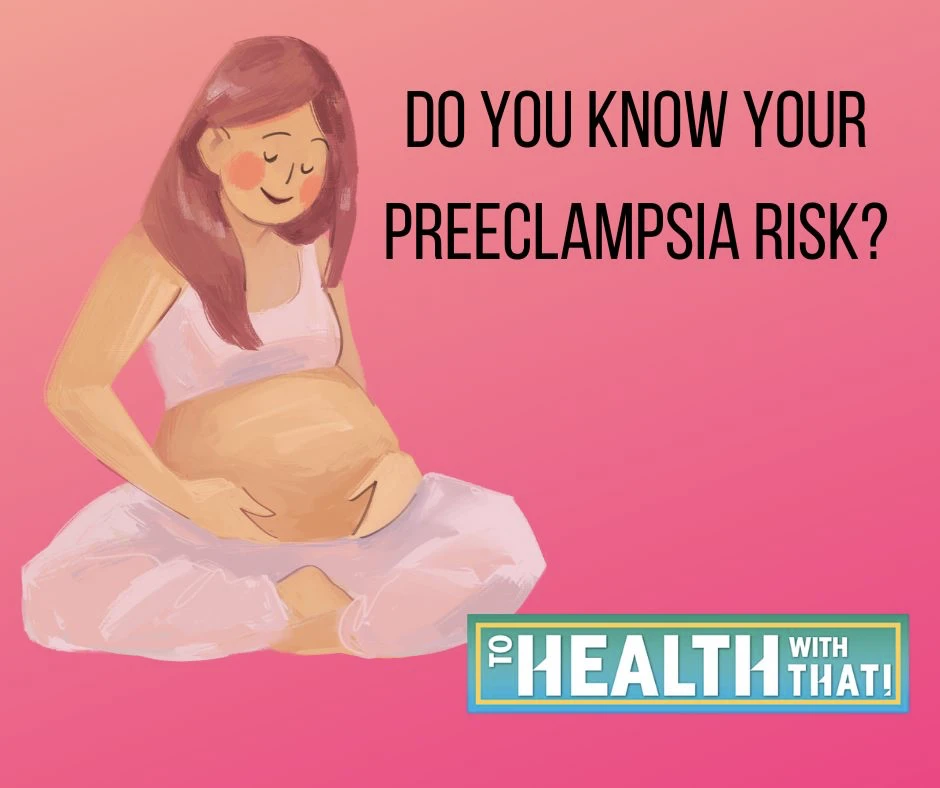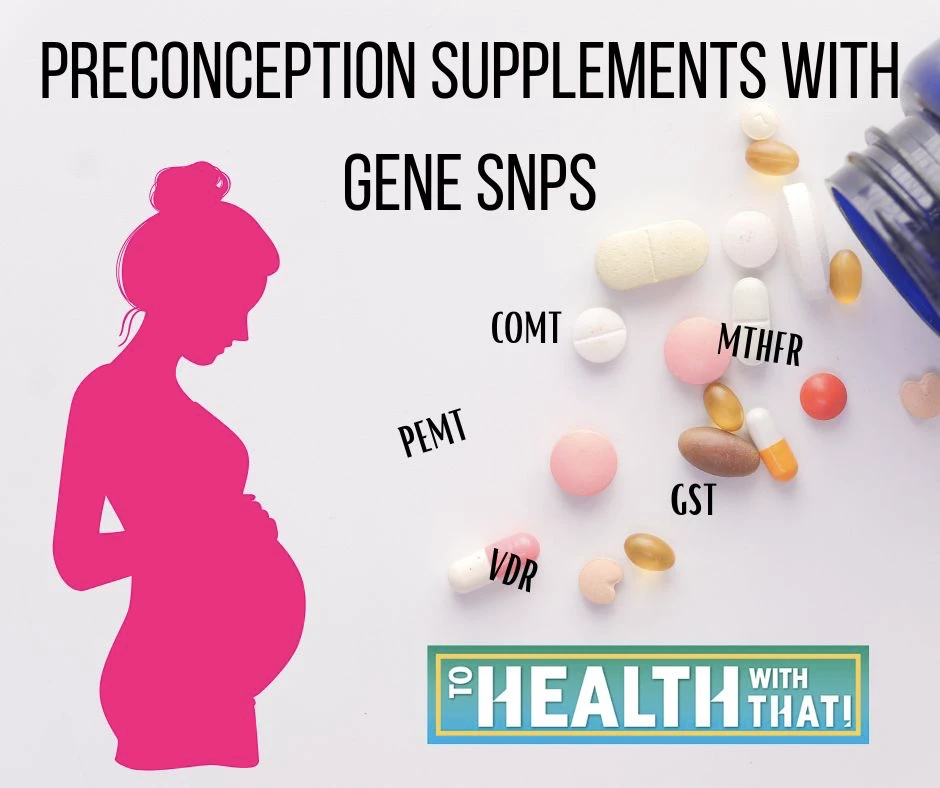Preconception supplements are generally great for everyone who is trying to get pregnant and wants to give their baby the healthiest start possible. Last week, we talked about the best general preconception supplements to start your pregnancy right. Here are a few changes or additions that might be useful with higher preeclampsia risk or with genetic variants and different gene SNPs.
Preconception Supplements With MTHFR
MTHFR is implicated in repeat pregnancy loss, folate abnormalities, and neural tube defects including spina bifida. It is incredibly important to get good quality preconception supplements to help prevent some of these complications.
Prenatal vitamins matter so much with MTHFR and the requirements are generally the same as in our previous post, but it is imperative that the form of folate is 5-L methyltetrahydrofolate, quatrifolate, or another active methylated folate and NOT folic acid. We have talked previously about the dangers of folic acid to people with MTHFR mutations and also the detrimental effect of 5000 mcg folic acid in pregnancy for people with the MTHFR polymorphism.
Omega-3 fatty acids have a synergistic effect with B vitamins in people with MTHFR polymorphisms, and taking a good dose of omega-3 fatty acids is even more important if you’re planning for pregnancy. For a typical pregnancy we suggest 1200 mg EPA and 800 mg DHA, but if you have an MTHFR polymorphism and have had previous miscarriages, then an even higher dose could be advisable.
There is also some evidence that repeat miscarriages in women with MTHFR polymorphisms could be linked to micro clotting.

Preeclampsia – Risk Factors and Prevention
“The American College of Obstetricians and Gynecologists issued the Hypertension in Pregnancy Task Force Report recommending daily low-dose aspirin beginning in the late first trimester for women with a history of early-onset preeclampsia and preterm delivery at less than 34 0/7 weeks of gestation, or for women with more than one prior pregnancy complicated by preeclampsia.
Daily low-dose aspirin use in pregnancy is considered safe and carries a low likelihood of serious maternal, or fetal complications, or both, related to use. Low-dose aspirin (81 mg/day) prophylaxis is recommended in women at high risk of preeclampsia and should be initiated between 12 weeks and 28 weeks of gestation (optimally before 16 weeks) and continued daily until delivery. Low-dose aspirin prophylaxis should be considered for women with more than one of several moderate risk factors for preeclampsia.
Women at risk of preeclampsia are defined based on the presence of one or more high-risk factors, or more than one moderate risk factor.
High risk factors for preeclampsia include:
- Previous history of preeclampsia
- Multifetal gestation (twins, triplets, etc…)
- Renal disease
- Autoimmune disease
- Type 1 or type 2 diabetes
- Chronic hypertension
Moderate Risk Factors for Preeclampsia
- First pregnancy
- Maternal age of 35 years or older
- Body mass index greater than 30
- Family history of preeclampsia
- Possibly MTHFR and COMT slow polymorphisms, which have been shown in research to contribute to preeclampsia.
Magnesium Supplements in Pregnancy
We spoke about this in our basic pregnancy supplements article as well, but magnesium is also used for constipation in pregnancy, which most pregnant women will experience at some time, and leg cramps or restless legs.
Magnesium sulphate is also given to women with pre-eclampsia to prevent eclamptic seizures, and because of this it is possible that magnesium during the pregnancy might help to reduce the chances of preeclampsia, although the research has not shown this yet.
A study of 416 pregnant women, half of whom were given magnesium supplements and half who were not, showed only a small difference in the rates of preeclampsia between the two groups. 18.9% of the magnesium group developed preeclampsia, where 19.7% of the non-magnesium group did. This shows some reduction, but not enough to be statistically significant.

Preconception supplements with PEMT Gene SNP
PEMT changes the way your body is able to make phospatidylcholine, which is a necessary compound for all cell membranes, helps to form the myelin sheath around nerves which is especially important in brain health, and is the precursor for important cellular messengers. and it is methylation-dependent.
These phospholipids are especially important for rapidly dividing cells, like the ones in your baby and so supplementing in early pregnancy is a good idea for anyone, but especially with a PEMT or MTHFR polymoprphism.
These supplements can be choline, which is included in a lot of prenatal packet-type vitamins or from lecithin from sunflower, eggs, or soy.
Preconception supplements with COMT slow
Talk with your OB/GYN or midwife, but supplemental progesterone might be more necessary in this group. COMT slow causes slower processing of estrogens and typically higher estrogen levels, which can interfere with estrogen to progesterone balance. Also, COMT issues generally cause a higher likelihood of preeclampsia (just like MTHFR) and so magnesium supplementation at the highest dose tolerated might help to prevent.
Preconception supplements with vitamin D receptor gene SNP VDR
Studies have shown that additional vitamin D could be useful in pregnancy for women who have VDR gene polymorphisms. Low vitamin D is implicated in repeat pregnancy loss for all mothers, but mothers with VDR may need to keep a higher resting level of vitamin D to avoid pregnancy complications. The normal range for vitamin D is 25 or 30 nmol/L depending on your lab, but studies show that the babies of VDR mothers who have vitamin D status less than 50 mol/L are more likely to have medical issues, where the babies of VDR mothers with vitamin D status greater than 50 nmol/L had reasonably normal anthopometrics (measurements) and outcomes.
Preconception supplements with glutathione gene SNPS GST or GPX
Women with the GST or GPX polymorphisms absolutely should take NAC to help boost glutathione levels and counteract the negative effects of these gene SNPs. Babies born to these mothers may be more susceptible to harm from environmental toxins while in utero. Prenatal paraben exposure was linked to premature birth and low birth weight in babies born to GST moms. and mothers who smoke and have the GST polymorphism have worse outcomes than mothers who smoke but don’t have the GST variants.
Also, lower glutathione peroxidase and SOD levels are also associated with preeclampsia risk and so this group may want to consider magnesium supplementation as well.
Remember that giving your baby and your body what you need during pregnancy can boost your baby’s health long-term and make your recovery easier. Knowing your gene SNPs around pregnancy can help tremendously.

This podcast breaks up BIG health topics, like MTHFR, into small, easy bites. All in ten minutes or less.
We’ll talk about why folic acid can be toxic, how the MTHFR enzyme is in bed with estrogen, why you want to turn genes off, and how folate and depression are linked. Season 3 features Dr. Kate Naumes, women’s health expert, to deep dive into hormones and infertility.
Check the show notes at tohealthwiththat.com for more info and downloadable. Have MTHFR? Join genetic rockstars now at community.tohealthwiththat.com and for more info about Dr. Kate go to naumesnd.com
Doing a good detox protocol takes some preparation and some of the best preparation you can do is finding out if your genes are making detoxification harder for you somewhere. Some gene SNPs have the potential to make detox harder by interfering with phase two conjugation reactions. These include MTHFR, MTR, MTRR, GST, GPX, COMT, HNMT, UGT1A1, SULT genes, NAT1, and NAT2.
With each category of gene SNP, I will also give suggestions for improving that aspect of your phase two detoxification reactions.
00:00 – Intro
00:49 – Why SNPs matter and how to test
02:08 – Genes that affect methylation and how to help
02:46 – Genes that affect glutathione and how to help
03:38 – Genes that affect sulfation and how to help
04:20 – Genes that affect glucuronidation and how to help
05:52 – Genetic Rockstars walkthrough
07:42 – Genes that affect acetylation and how to help
08:11 – Amino acid conjugation
GENETIC ROCKSTARS (an MTHFR community): community.tohealthwiththat.com
FREE COURSE: MTHFR Basics: https://to-health-with-that.teachable.com/p/mthfr-basics
WORK WITH DR. AMY ONE-ON-ONE: Set up a free meet and greet appointment to see if we’re a good fit to work together, or if group coaching, community, or something else might be a better option: https://calendly.com/amy-tohealthwiththat/15min
GROUP COACHING: https://www.tohealthwiththat.com/group-coaching/
WEBSITE: https://tohealthwiththat.com/
AFFILIATE LINKS:
I appreciate you using these links to purchase products you would buy anyway, because they allow me to keep putting information out there. Thank you!
SEEKING HEALTH (methylation and histamine support supplements – these ship internationally): https://bit.ly/3afXYH4
STRATEGENE REPORT (detailed genetics using 23andme or ancestry raw data): https://bit.ly/3retbm5
FULLSCRIPT (professional grade supplements): https://us.fullscript.com/welcome/thwt
QUEEN OF THE THRONE (castor oil and castor oil packs): https://shop.queenofthethrones.com/amy-tohealthwiththat use code AMY_TOHEALTHWITHTHAT10 for 10% off of any order of $59 or more
—
Send in a voice message: https://podcasters.spotify.com/pod/show/tohealthwiththat/message

MTHFR is a common genetic mutation that can contribute to anxiety, depression, fatigue, chronic pain, infertility, and more serious conditions like breast implant illness, heart attack, stroke, chronic fatigue syndrome, and some types of cancer. If you know or suspect you have an MTHFR variant, schedule a free 15-minute meet-and-greet appointment with MTHFR expert Dr. Amy today.
Book Your Appointment
